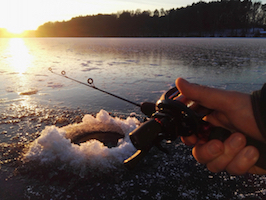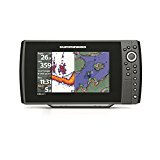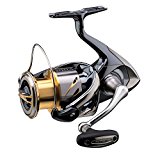Atlantic Salmon Winter Fishing

Some people make the claim, incorrectly, that Atlantic Salmon don’t eat during the winter. The truth is that the fish get the reputation as not feeding after a bad fishing outing instead of the angler taking the blame.
After spawning, Atlantic Salmon are exhausted. So much so that many of them don’t survive to live another year. In fact over 80 percent or more end up dying off.
After Spawning Activities
Atlantic Salmon try to conserve energy in winter. In order to do this they avoid places in the river that require a lot of energy like fast flowing areas or any pools right under a waterfall. Therefore knowledge of their habitat is critical.
They’ll find downstream pools that are deep and relatively current free.
How to catch Atlantic Salmon in Winter
When ice fishing for Atlantic Salmon in landlocked lakes, use shiners just a few feet under the ice in open deep water. You might also want to check with state fish and wildlife as many states stock ponds and lakes with Atlantic Salmon.
Unlike other wintering fish like largemouth bass, Atlantic Salmon stick close to the ice. After landing your first salmon, look for scars on the top of its head from bumping into the ice.
A useful technique is to drill five holes at about 75 feet apart in a straight line across the deep part of the lake using 3 feet of monofilament line for the leader.
Overwintering Salmon Kelts
Kelts are salmon that have spawned. You’ll identify them by the distended vent and red gill filaments with the presence of “gill maggots”. Often anglers in spring will come across them when they regain their silvery appearance.
Salmon kelts avoid overwintering in frazil-laden pools*.
Most kelts spend much of their winter below the head of the tide to avoid the ice conditions. However as ice can come quickly after spawning in some areas, Atlantic Salmon kelts do most of their movement during the early part of winter.
After the ice forms in the river, there’s little time for movement and it’s this explanation that’s given for movement prior to ice freeze up. During the months of January, February and even March, kelts pretty much stick to the same location. They attempt to conserve energy and won’t go long distances looking for food.
Ice Fishing opens up at different times in different countries and states. For New Brunswick, for example, ice fishing season opens in January and closes by the end of March.
Note: *Frazil laden pools are soft or amorphous ice formed by the accumulation of ice crystals in water that’s too turbulent to freeze solid.


